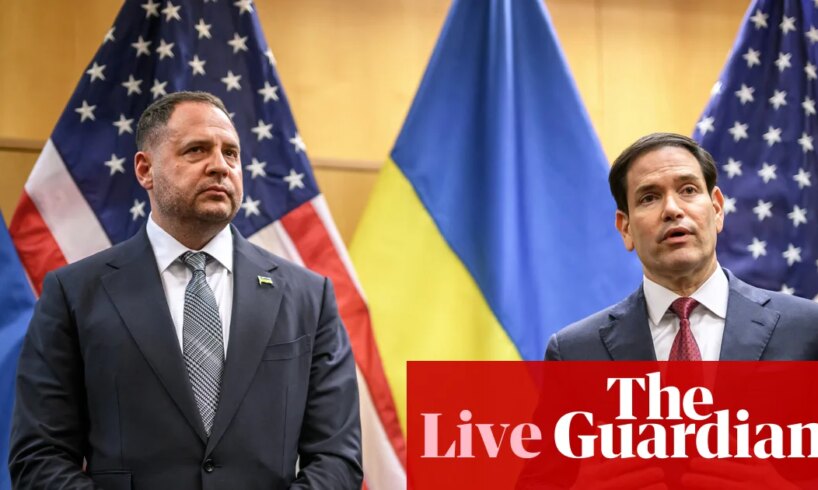
European defence company shares and gas prices fall after US and Ukraine discuss peace plan
European defence company stocks have dropped at the start of trading, and wholesale gas price are down too, after officials from Washington and Kyiv held weekend talks in Geneva over how to end the Ukraine-Russia war.
Last night, the US and Ukraine said they had created an “updated and refined peace framework” to end the war with Russia, after a row over an original US-backed document that included many of Moscow’s demands.
The US secretary of state, Marco Rubio, said he was “very optimistic” about the progress of the talks in Switzerland.
Rubio told reporters:
“I think we made a tremendous amount of progress.
We’ve really moved forward, so I feel very optimistic that we’re going to get there in a very reasonable period of time, very soon.”
Volodymyr Zelenskyy’s chief of staff, Andriy Yermak, also sounded positive, saying the sides had made “very good progress”, and were “moving forward to the just and lasting peace Ukrainian people deserve”.
Ukraine’s European allies published their own Kyiv-friendly plan on Sunday. It says negotiations over territory should take place after a ceasefire is agreed and should start from the line of contact – the existing frontline.
The war continued over the weekend, though, with a Russian drone strike on the major Ukrainian city of Kharkiv killing four people and wounding 17 on Sunday.
Hopes that the Geneva talks could lead to a breakthough to end the talks – leading to fewer weapons sales – knocked German defence firm Rheinmettal down by 3.5% at the start of trading.
Renk, which makes propulsion and drivetrain components for military vehicles, are down over 4%.
In London, defence contractor Babcock’s shares have dropped by 1.4%, while BAE Systems dipped 1% at the open.
Seperately, Bloomberg reports that European natural gas prices have hit an 18 month low today.
They say:
European natural gas dropped below €30 a megawatt-hour for the first time in more than a year amid discussions about a potential end to Russia’s war in Ukraine.
Benchmark futures hit the lowest levels since May 2024. They had been trading in a narrow band for weeks as traders weighed the region’s ample supplies against frequently shifting weather forecasts, assessing whether there’ll be enough gas to get through winter.
Share
Updated at 09.39 CET
Key events
Show key events only
Please turn on JavaScript to use this feature
German business morale falls as companies lose faith in recovery
German business morale has unexpectedly fallen this month, as companies lose hope on a recovery of the German economy following two years of contraction.
The Ifo institute has reported that its business climate index fell to 88.1 in November from 88.4 in October, weaker than expected. It’s a blow to German chancellor Friedrich Merz’s efforts to revive growth through a major spending package.
Ifo president Clemens Fuest warns:
“Companies have little faith that a recovery is coming anytime soon.”
Carsten Brzeski, global head of macro at ING, says the survey paints a bleak picture of Germany’s economy as the end of the year approaches.
The problem, Brzeski explains, is that German policymakers still haven’t found a convincing answer to the structural challenges facing their economy:
Like U2 sang almost 40 years ago: the German economy still hasn’t found what it’s looking for.
The year 2025 has been another year of hope and disappointed optimism. A year which saw excitement and enthusiasm sparked by Germany’s unprecedented fiscal policy U-turn and its decision to invest significantly in infrastructure and defence this spring. But also a year that brought a rude awakening and a cringing feeling as we watched the new government undermine the positive impact of fiscal stimulus with clumsy budgetary decisions, new political tensions, and a lack of structural reforms.
The mood in Germany soured and optimism ground to a halt – and not just because of US tariffs or a stronger euro, both of which complicate matters for the export industry.
Share
Despite the drag from the defence sector, Britain’s stock market is on track for its third daily gain in a row.
The FTSE 100 index is up 18 points or 0.2% at 9556 points, extending a rally that began last Thursday (after falling for the previous five sessions).
Sentiment has improved after a top US Federal Reserve official said on Friday that interest rates can fall “in the near term”, which has bolstered hopes of an interest rate cut next month.
New York Fed President John Williams argued that interest rates could fall without putting the Fed’s inflation goal at risk, while helping guard against a slide in the job market.
Share
Updated at 10.27 CET
EU’s Šefčovič reports ‘constructive’ talks with US officials
Lisa O’Carroll
EU’s trade commissioner Maroš Šefčovič has said he has had “constructive” talks with US trade representative Jamieson Greer yesterday and US commerce secretary Howard Lutnick this morning.
But he said “more work lies ahead” to reduce tariffs “especially on steel and steel derivatives”.
He told reporters on the way into a summit of 27 trade ministers that they would also “discuss our relations with China” and a shared goal of “securing reliable supplies” in critical minerals”.
“We also recognise that more work lies ahead especially on steel and derivatives, where we seek both to reduce tariffs and to confront global capacity”.
Greer and Lutnick will meet all 27 trade ministers at lunch time today and will also hold talks with business leaders and two other commissioners, including Henna Virkunnen who is responsible for the tech sector and defence commissioner Andrius Kubilius.
Share
EU-US trade deal talks today
Lisa O’Carroll
Efforts to persuade Donald Trump to slash his punitive 50% tariff on steel and hundreds of products with an element of steel from knitting needles to wind turbines have to be seen in the context of the recent battle with China over chips, EU trade ministers have said.
They may also be impacted by the US’s widely criticised peace proposals for Ukraine with fears that the EU’s pushback on Trump’s plan could impinge on talks his trade team will hold in Brussels today.
EU trade ministers meeting in Brussels today hope to persuade US trade representative Jamieson Greer and commerce secretary Howard Lutnick that they should work together against China and reduce the punitive 50% tariffs on steel and form a united front “ringfencing” the US and bloc against cheap imports.
“We are in a very important moment in transatlantic relations,” Polish trade Michał Baranowski said.
“We are all watching very closely what is going on in Geneva and here it is clear that our economic and political relations have to go hand in hand,” he told reporters on the way into a summit of the EU’s 27 trade ministers.
Danish trade minister Morten Bødskov has said today’s meeting was about how they can “fulfill the implementation of the joint statement” setting out the tariff deal in late August “and stabilise trade relations between Europe and US”.
But he added:
“It is also a great opportunity to discuss the problems we have in common, the global trade system, China etc.”
Share
European defence company shares and gas prices fall after US and Ukraine discuss peace plan
European defence company stocks have dropped at the start of trading, and wholesale gas price are down too, after officials from Washington and Kyiv held weekend talks in Geneva over how to end the Ukraine-Russia war.
Last night, the US and Ukraine said they had created an “updated and refined peace framework” to end the war with Russia, after a row over an original US-backed document that included many of Moscow’s demands.
The US secretary of state, Marco Rubio, said he was “very optimistic” about the progress of the talks in Switzerland.
Rubio told reporters:
“I think we made a tremendous amount of progress.
We’ve really moved forward, so I feel very optimistic that we’re going to get there in a very reasonable period of time, very soon.”
Volodymyr Zelenskyy’s chief of staff, Andriy Yermak, also sounded positive, saying the sides had made “very good progress”, and were “moving forward to the just and lasting peace Ukrainian people deserve”.
Ukraine’s European allies published their own Kyiv-friendly plan on Sunday. It says negotiations over territory should take place after a ceasefire is agreed and should start from the line of contact – the existing frontline.
The war continued over the weekend, though, with a Russian drone strike on the major Ukrainian city of Kharkiv killing four people and wounding 17 on Sunday.
Hopes that the Geneva talks could lead to a breakthough to end the talks – leading to fewer weapons sales – knocked German defence firm Rheinmettal down by 3.5% at the start of trading.
Renk, which makes propulsion and drivetrain components for military vehicles, are down over 4%.
In London, defence contractor Babcock’s shares have dropped by 1.4%, while BAE Systems dipped 1% at the open.
Seperately, Bloomberg reports that European natural gas prices have hit an 18 month low today.
They say:
European natural gas dropped below €30 a megawatt-hour for the first time in more than a year amid discussions about a potential end to Russia’s war in Ukraine.
Benchmark futures hit the lowest levels since May 2024. They had been trading in a narrow band for weeks as traders weighed the region’s ample supplies against frequently shifting weather forecasts, assessing whether there’ll be enough gas to get through winter.
Share
Updated at 09.39 CET
Anglo shares drop
Shares in Anglo American have dropped by around 1% in early trading, as City investors react to BHP’s decision to initiate merger talks, and then walk away.
The situation doesn’t seem to disrupt Anglo’s existing plans to merge with Canadian rival Teck Resources.
But perhaps there was a lingering hope that the Teck deal might have flushed out a bidder.
As my colleague Nils Pratley wrote, astutely, in September:
The structure… looks like an open invitation to bigger rivals to bid for either Anglo and Teck, both of whom have seen off wannabe buyers in recent years.
Share
Kaan Peker, analyst with RBC in Sydney, has said (via CNBC) that BHP’s latest approach for Anglo looks ‘a little messy’:
“There’s probably a handful of times when assets like this are up for sale, so BHP may as well assess if the option is open. But it does look a little messy from the BHP side.
Share
Updated at 08.50 CET
BHP’s second failed approach for Anglo American does not suggest fears about the global economic outlook, argues Kathleen Brooks, research director at XTB, who says:
There was also M&A news over the weekend. BHP made another offer for FTSE 100 miner Anglo American.
The UK company is already in a $50bn merger with Teck Resources, which was designed, in part, to rebuff takeover attempts. BHP has now said that it has walked away from the deal, however, if there was deep concern about the global economy, or the potential for a deep stock market crash, then it would be unlikely to see any takeover attempts, rebuffed or not, in the resources sector.
Share
One banker has told the Financial Times that it is a surprise that BHP had returned to the fray only to give up its chase for Anglo so quickly, saying:
“I thought they’d come back and finish it. To come back and not to finish it is quite amazing.”
Share
Introduction: BHP walks away from fresh Anglo American tie-up
Good morning, and welcome to our rolling coverage of business, the financial markets and the world economy.
A mega-merger deal in the mining sector has briefly burst back into life, before being dampened down.
Last night, news broke that mining group BHP had made a new takeover approach to Anglo American, over a year after its previous wooing was rejected. This fresh burst of enthusiasm threatened to disrupt Anglo’s plans to merge with Canadian rival Teck Resources, to create a £39bn global copper group, which has yet to be approved by shareholders.
BHP, it was reported, was proposing a deal based on a mix of cash and stock to Anglo.
But BHP’s new overtures appear to have been batted aside by Anglo, as it has now told shareholders:
“Following preliminary discussions with the board of Anglo American, BHP confirms that it is no longer considering a combination of the two companies.”
BHP insists that a deal would make sense, before then arguing that it can cope fine with Anglo, saying:
Whilst BHP continues to believe that a combination with Anglo American would have had strong strategic merits and created significant value for all stakeholders, BHP is confident in the highly compelling potential of its own organic growth strategy.
Under City rules, BHP is now blocked from bidding for Anglo for six months, unless there is a change in circumstances.
Back in 2024, BHP made three failed attempted to agree a merger with Anglo, before declaring in October that it had ‘moved on’.
Given last year’s rebuttal, and Anglo’s subsequent tie-up with Teck, BHP’s move is a little surprising.
As portfolio manager Andy Forster at Argo Investments in Sydney put it:
It’s a last throw of the dice for BHP.
I’m a bit surprised that, given the relative performance that they thought they’re in a position to come back and do another deal and extract value for shareholders.”
The agenda
Share
Source





